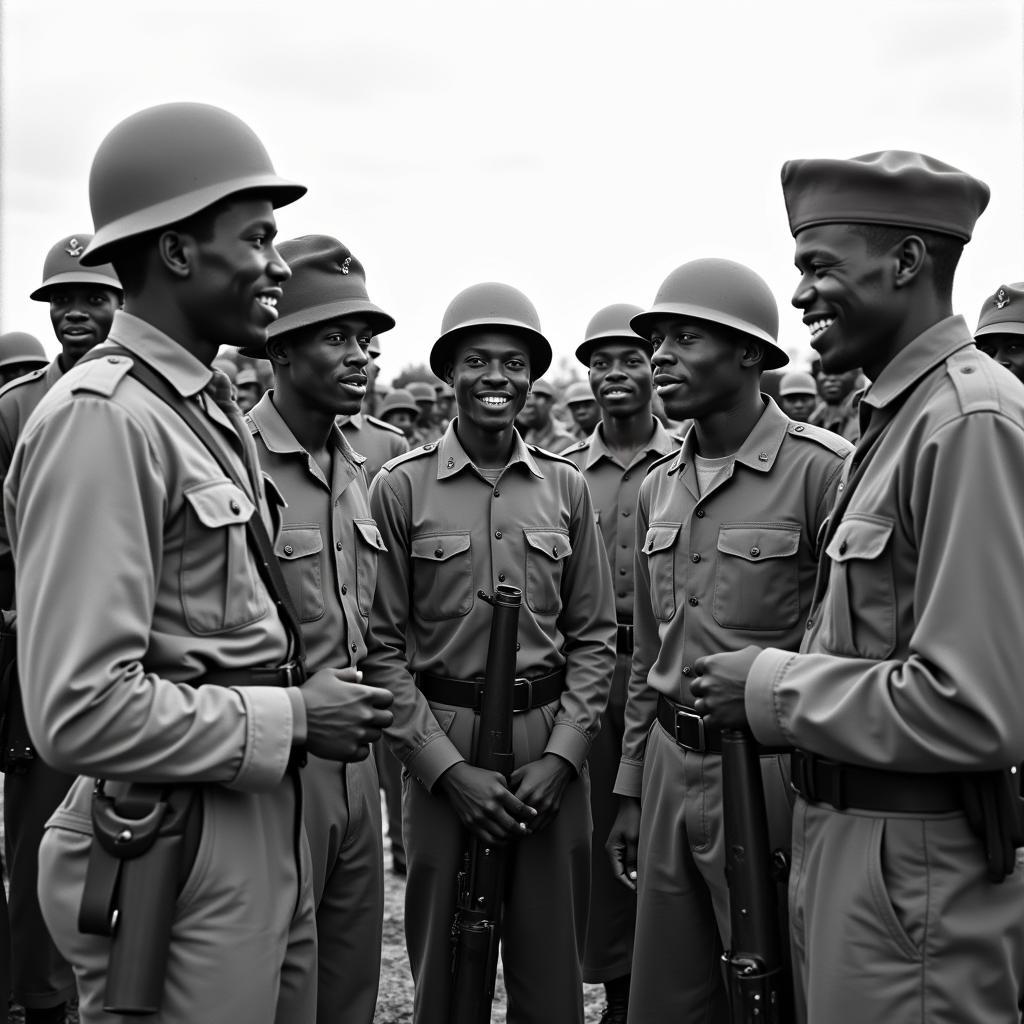African Americans During World War 2: A Story of Service and Struggle
African Americans during World War 2 faced a double battle: fighting against fascism abroad and discrimination at home. Despite facing segregation and prejudice, hundreds of thousands of Black Americans contributed significantly to the war effort, both in the military and on the home front. Their experiences shaped the Civil Rights Movement and redefined their role in American society.
The Double V Campaign: Victory Abroad and at Home
Black Americans served in every branch of the military, although often in segregated units and support roles. The Tuskegee Airmen, a group of African American fighter pilots, became renowned for their bravery and skill, escorting bombers and proving their capabilities despite widespread prejudice. The desire for victory against fascism abroad and against discrimination at home became known as the Double V Campaign. This campaign highlighted the hypocrisy of fighting for democracy overseas while denying it to Black citizens. African Americans were determined to prove their patriotism and demand equal rights.
 African American Soldiers in WWII
African American Soldiers in WWII
The contributions of African Americans extended far beyond the battlefield. On the home front, they filled vital roles in factories and industries, contributing to the wartime production effort. The Great Migration, which had begun in the early 20th century, accelerated during the war, as African Americans moved north and west in search of better economic opportunities and to escape the Jim Crow South. This migration led to significant demographic shifts and laid the groundwork for the future Civil Rights Movement.
Facing Discrimination in the Military and Beyond
Despite their service and sacrifices, African American soldiers often faced discrimination within the military. They were relegated to segregated units, given inferior equipment, and denied opportunities for advancement. Even basic amenities, like access to recreational facilities and mess halls, were often segregated. This institutionalized racism within the military mirrored the broader societal prejudice that permeated American life.
How did segregation impact African American soldiers during WWII?
Segregation created a two-tiered system within the military, limiting opportunities and undermining morale for African American soldiers. It reinforced the message that they were not considered equal citizens, even while risking their lives for their country.
The experiences of african american slaves throughout history resonated with the discrimination faced during the war.
What role did African American women play during the war?
African American women served in the military in auxiliary roles, such as the Women’s Army Corps (WAC) and the Women’s Army Auxiliary Corps (WAAC). They also worked in factories and took on other essential jobs on the home front, often filling the roles left vacant by men who had gone to war.
The Legacy of World War II for African Americans
The war experience profoundly impacted African Americans. The hypocrisy of fighting for democracy abroad while facing discrimination at home fueled the growing Civil Rights Movement. The contributions and sacrifices of Black Americans during the war helped to challenge racial stereotypes and lay the groundwork for future progress in the fight for equality. Many historians see World War II as a turning point in the struggle for civil rights, paving the way for the landmark achievements of the 1950s and 1960s.
Did you know about the significance of african freedom day in this context? It serves as a reminder of the ongoing struggle for liberation and equality.
Even something as seemingly simple as african cut hair became a symbol of identity and resistance during this era.
The legacy of african americans in medicine also intertwined with the war effort, highlighting their contributions to healthcare. Just as vital were the contributions related to african brown beans and other food staples that sustained communities during wartime.
Conclusion
African Americans during World War 2 made significant contributions to the war effort both on the battlefields and the home front, despite facing persistent discrimination. Their experiences during the war fueled the burgeoning Civil Rights Movement and laid the foundation for the fight for equality in the decades that followed. Understanding their story is crucial for comprehending the complexities of American history and the ongoing struggle for social justice.
FAQ
- What was the Double V Campaign?
- How did segregation impact African American soldiers?
- What role did African American women play during WWII?
- How did WWII contribute to the Civil Rights Movement?
- What were some of the challenges faced by African Americans during WWII?
- What were some of the key contributions of African Americans to the war effort?
- How did the experiences of African Americans during WWII shape their future?
Some common scenarios might include researching family history, understanding the historical context of segregation, or exploring the impact of WWII on the Civil Rights Movement.
You might also be interested in learning more about specific battles, units, or individuals involved in the war. Check out our other articles on African American history and culture.
For further assistance, please contact us at +255768904061, email [email protected], or visit us at Mbarali DC Mawindi, Kangaga, Tanzania. Our customer service team is available 24/7.



